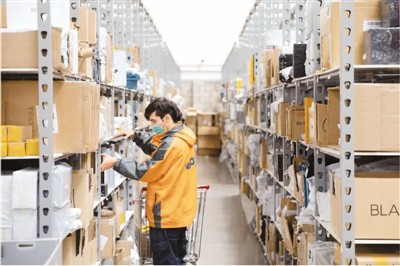

With their geographical advantage, overseas warehouses have aided Chinese companies to boost sales of their products.
Ningbo HOOYA Import & Export Group Co., Ltd. based in Ningbo city, east China’s Zhejiang province, has built 20 overseas warehouses covering 400,000 square meters, using the facilities to not only store its own products, but also transport and sell products for other foreign trade companies.
10 years ago, the company registered low profits through selling daily necessities at low prices, now it sells more than 15,000 products under 20 categories in European and US markets. Last year, its turnover doubled that a year before.

A worker sorts parcels at a warehouse built by Cainiao Network, the logistics arm of Alibaba Group in Spain, Nov. 11, 2020. (Photo/Xinhua)
At present, the number of overseas warehouses established by Chinese companies has exceeded 1,800, becoming a new foreign trade infrastructure to support the development of cross-border e-commerce and expand the international market.
Ruston Express, an international logistics company based in northeast China’s Heilongjiang province, built the country’s first overseas warehouse in Russia in 2015. Covering 11,000 square meters, the warehouse could send parcels to customers within one day.
In the first three quarters of 2020, China's imports and exports through the customs cross-border e-commerce management platform reached 187.4 billion yuan ($28 billion), a year-on-year increase of 52.8 percent, official statistics show.
“Warehouse has become an important link on the development of cross-border e-commerce. The process of building overseas warehouses, shipping commodities in bulk to the overseas warehouses and then delivering them to customers through local logistics has effectively improved logistics efficiency and reduced operational cost,” said Zhang Jianping, a researcher with the Chinese Academy of International Trade and Economic Cooperation under the Ministry of Commerce.
Within only half a day after placing an order on AliExpress, Chinese e-commerce giant Alibaba's online global retail platform, a consumer from Spain received the TV set delivered from a warehouse located in his own country during a shopping spree last November.
Warehouses also help cross-border e-commerce companies localize their businesses, an official with the Ministry of Commerce pointed out.
In Indonesia, Chinese e-commerce giant JD.com has established a logistics chain incorporating the functions of warehouse and express service, extending its delivering services to 483 cities and seven islands in the country and reducing the delivery time of 85 percent of the orders to one day from five to seven days.

Logistics workers transport a TV set made in China at a warehouse built by Cainiao Network, the logistics arm of Alibaba Group in Spain. (Photo/Xinhua)
Xiong Wei with Cainiao Network, the logistics arm of Alibaba Group, told People’s Daily that overseas warehouses give companies stronger independence to decide which products to export and when and where to export them, so that companies could better arrange their supply chains.
China has been offering firm support to the development of overseas warehouses in recent years.
In 2014, the country issued guidelines, proposing to build an international marketing network including overseas warehouses. In 2016, the government work report explicitly pointed out that the country would support enterprises to build their overseas warehouses. In November 2020, the State Council enacted guidelines on facilitating development of foreign trade, pledging to support the construction of overseas warehouses.
Under such policy support, overseas warehouses have achieved localized operation as they nowadays provide one-stop customs clearance, consulting services, high-quality after-sales services for cross-border e-commerce companies.
Construction of overseas warehouses is an important measure for ensuring stability of the supply chain and matching supply with demand in the time of the COVID-19 pandemic, which has impeded cross-border logistics, especially cold chain logistics, said Liu Xiangdong, a researcher at the China Center for International Economic Exchanges.
 Fire brigade in Shanghai holds group wedding
Fire brigade in Shanghai holds group wedding Tourists enjoy ice sculptures in Datan Town, north China
Tourists enjoy ice sculptures in Datan Town, north China Sunset scenery of Dayan Pagoda in Xi'an
Sunset scenery of Dayan Pagoda in Xi'an Tourists have fun at scenic spot in Nanlong Town, NW China
Tourists have fun at scenic spot in Nanlong Town, NW China Harbin attracts tourists by making best use of ice in winter
Harbin attracts tourists by making best use of ice in winter In pics: FIS Alpine Ski Women's World Cup Slalom
In pics: FIS Alpine Ski Women's World Cup Slalom Black-necked cranes rest at reservoir in Lhunzhub County, Lhasa
Black-necked cranes rest at reservoir in Lhunzhub County, Lhasa China's FAST telescope will be available to foreign scientists in April
China's FAST telescope will be available to foreign scientists in April "She power" plays indispensable role in poverty alleviation
"She power" plays indispensable role in poverty alleviation Top 10 world news events of People's Daily in 2020
Top 10 world news events of People's Daily in 2020 Top 10 China news events of People's Daily in 2020
Top 10 China news events of People's Daily in 2020 Top 10 media buzzwords of 2020
Top 10 media buzzwords of 2020 Year-ender:10 major tourism stories of 2020
Year-ender:10 major tourism stories of 2020 No interference in Venezuelan issues
No interference in Venezuelan issues
 Biz prepares for trade spat
Biz prepares for trade spat
 Broadcasting Continent
Broadcasting Continent Australia wins Chinese CEOs as US loses
Australia wins Chinese CEOs as US loses